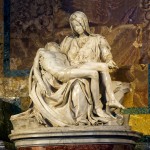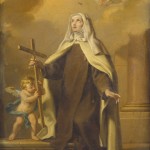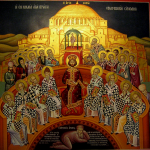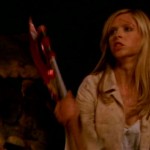I sadly don’t have any awesome stories about how Pope John Paul II impacted my life. I took him for granted growing up and when he passed away, I just thought it was a natural thing. It wasn’t until after Pope John Paul II died that I started learning about how awesome he was. Thankfully, my friend Emily Allen has her own story to tell:
On the 10th anniversary of his death, I have been asked my the lovely Monique Ocampo to share how John Paul II has affected my life. When I was growing up, there was a statue of the pope outside my parish church. This was erected in the 90’s, when he was still alive. It was not a memorial, it was a show of pride. Coming from a Polish family, living in a Polish area, going to a Polish parochial school, it was a big deal to have a Polish pope.
In the 20th century, many Polish immigrants came after their homeland was torn up and split between various countries. With a culture and a language that was unlike any previous immigrant families from Ireland and Italy, and an influx of foreigners coming to take jobs, there was a fair amount of prejudice against Eastern Europeans. Many tried to assimilate as quickly as possible for fear of being seen as “un-American.” Being proud of being Polish was asking for public embarrassment.
Back in Europe, things were even worse for Poles. Someone was always invading; always trying to replace the language, the religion, the culture of the Poles. Whether it was Germany, Austria, Hungary, Russia- for a long time, Poland was a country located in the heart, rather than the map. Keeping traditions safeguarded citizenship to the non-existent Poland.
But this man- Karol Wojtyla, Pope St. John Paul II- changed all that.
At the end of Karol: A Man Who Became Pope, they show original footage of the announcement of John Paul II’s papacy. My family is always misty-eyed and full of warmth when we see our beloved Pope come out of St. Peter’s. My dad said the day he was elected, the phones were ringing off the hook. “We have a Polish Pope!!!” All of my relatives were calling each other up, crying.
Now, of course I didn’t experience that firsthand, but the feelings of pride and the notion that to be Polish is to be Catholic, and to always have pride in that, was instilled in me from a very young age. It’s hard to explain, but that strong sense of heritage made him feel like he was family. I thought of him as a grandfather. And so like any child sitting at their grandpa’s knee, hearing stories of the war and walking up hills both ways, I wanted to learn as much as I could about him. I don’t want to go into too much detail about his life- you can always read books about him from George Weigel or Jason Evert, which I highly recommend- but essentially it was full of suffering and loss. Despite the fact that he had every reason to be full of hate and bitterness, he wasn’t. He contemplated deeply on the challenges he was given so he could better understand the nature of man. He sought comfort in the Blessed Mother and the Cross. He always chose love. He was a writer, a poet, an actor- all things I am extremely passionate about. He believed in the importance of art and beauty.












